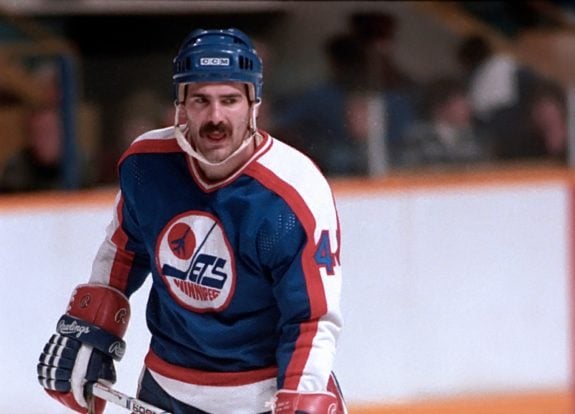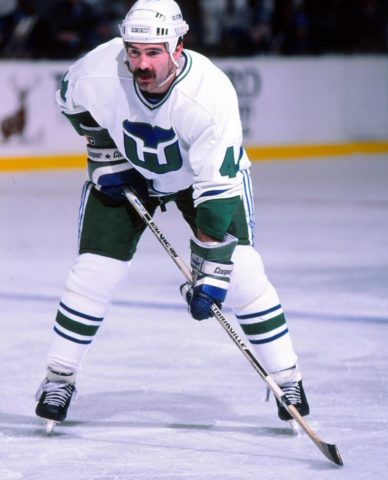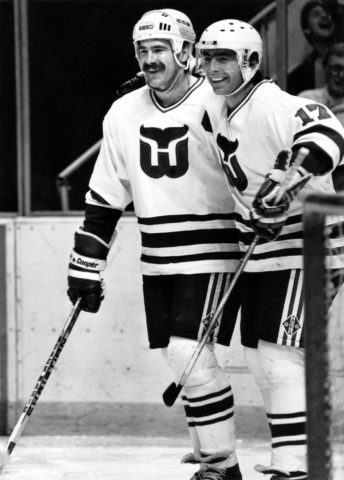Nearly every NHL franchise has “ones that got away” — players who found the bulk of their success after being traded or allowed to walk via free agency — and the Winnipeg Jets are no exception.
The best example of a Jet who achieved lofty things after leaving Winnipeg is defensemen Dave Babych.
Babych’s Too-Short Tenure with the Jets
After the Jets selected the 6-foot-2, 215-pound blueliner second overall in the 1980 NHL Entry Draft, he immediately made an impression on the franchise that went 20-49-11 in their first NHL campaign following the 1979 NHL-WHA Merger.
The Jets won a franchise-low nine games in Babych’s rookie season, but he impressed as a teenager fresh out of the Western Hockey League, posting six goals and 38 assists for 44 points (but was also a nearly-unthinkable minus-62.)
However, after the Jets selected superstar Dale Hawerchuk — who reached the 100-point plateau six times and ultimately recorded 929 points with the Jets in nine seasons — with their first and only first-overall pick in 1981, the Jets began lurching to respectability and the walrus moustache-sporting Edmonton product became a blue line cornerstone.
Related: Winnipeg Jets with 100-Point Seasons
He recorded 68 points in his sophomore season, 74 points in 1982-83, and 57 points in 1983-84. The Jets qualified for the playoffs all three of those seasons and Babych was selected as an NHL All-Star in the latter two campaigns.

In 1984-85, the Jets went 43-27-10 and advanced past the first round for the first time in franchise history. A big reason for that was the defensive duo of Babych and Randy Carlyle, who captured 62 and 51 points, respectively.
Sudden Trade Surprising, Overwhelmingly Unpopular
Babych — just entering his prime at age 24 — recorded 16 points in 19 games to begin the 1985-86 season, but despite being key in the Jets’ progression as a franchise and immensely popular with his teammates and fans alike, he had fallen out of favour with John Ferguson. The Jets general manager believed the d-man was too passive and needed to play with more meanness and intensity, hence unceremoniously traded him to the Hartford Whalers in exchange for forward Ray Neufeld.
“I have sacrificed the one of the better point men in the NHL for Neufeld,” Ferguson said in the wake of the November trade. “Hartford wouldn’t move him at any cost, except for Babych.” (from ‘The Franchise Sent to Hartford,’ Winnipeg Free Press, Nov. 21, 1985.)
The trade left the Jets’ d-corp depleted and panned in the harshest of terms by Winnipeg sportswriters.
“The loss of Babych hit the Jets like a death in the family. More than anyone else, they knew of his enormous talent, massive strength, and pleasant disposition,” Free Press sportswriter Reynolds “Reyn” Davis wrote a few days later.
“No one could skate faster, shoot harder, or pass as prettily…” Davis continued. “At 24, he was approaching his prime. Those who had suffered with him through his maturation as a pro hockey player will find him spending his most productive years somewhere else.”
From ‘Babych trade has long, Jets skating circles,’ Winnipeg Free Press, Nov. 26, 1985.
The deal caught many, including Babych himself, head coach Barry Long — who left Winnipeg Arena “close to tears” on the night of the trade — and Davis by complete surprise.
“What is astonishing is the fact the Jets, a team that is giving up goals at a phenomenal rate of almost five a night, would trade their second-best defenseman,” he wrote, predicting the Jets wouldn’t win another 20 games without Babych.
Babych Excelled in Hartford

Davis was right; The Jets — 8-9-2 when Babych was dealt —won just 18 more contests all season and finished 26-47-7, much worse than the year prior. They gave up 372 goals and a had an ugly -77 goal differential; Ferguson scapegoated Long and fired him after 66 games, opting to coach the team himself for the final 14 games.
Babych, meanwhile, excelled in his new digs. He finished 1985-86 with 69 points and was selected as an All-Star again. Between then and 1990, he was a Whalers’ mainstay, recorded 40-plus points every season, and helped them qualify for the postseason each season, too.
Neufeld Didn’t Work Out Well
The Winkler, Manitoba raised Neufeld — a hulking forward who Ferguson believed had 30-goal potential — didn’t nearly live up to expectations.
He wasn’t a total bust — he played parts of four seasons between 1985-89 and recorded 61 goals and 66 assists for 127 points in 249 games — but never scored more than 20 in a season and certainly didn’t have the impact Babych could have.
Another forward was not what the Jets needed as their back-end continued to be poroous. The team posted a positive goal differential just once during Neufeld’s tenure.
In 2015, Neufeld told the Pulp Hockey Podcast’s Steve Matthes that he felt he was treated unfairly as “the other guy” in the trade.
“I didn’t help myself by going 10 or 12 games without scoring after I got there. (John Ferguson) was supportive, Randy Carlyle took me ice fishing to try and get away from the rink and there were plenty of supportive players but as I said, Dave was popular there. Some guys never stopped talking about it. I won’t mention names, but there are some guys that I would never want to play with again that were in that room at that time,” he said.
“Nobody ever once said, ‘Why did the Jets make that trade?’ They just said it was the worst trade the Jets had ever made. They never held anyone else accountable for it as far as I knew — except for me. That one part of it was really ugly. I had no control of the trade. Fergie’s the one who made it, not me.”
Babych’s Long Career Continued with the Canucks
In 1990-91, Babych was limited to eight games due to wrist and thumb injuries. The Whalers left him exposed in the 1991 NHL Expansion Draft and he was claimed by the Minnesota North Stars, but they immediately flipped him to the Vancouver Canucks.

Babych continued to be a sturdy d-man throughout the 1990s. In 409 games in a Canucks sweater, he potted 23 goals and added 131 apples for 154 points.
Many of his milestones and most memorable moments came in his seven seasons on the West Coast. He scored the only hat trick of his career on Nov. 22, 1991 in a 6-5 win against the Calgary Flames; in the Canucks’ run to the Stanley Cup Final in 1994, Babych scored the game-winning goal in Game 5 against the New York Rangers (the Canucks ultimately fell in seven games.)
The Canucks, a poor team by the end of the decade, traded Babych to a strong Philadelphia Flyers club in 1998 to give him a chance to capture a Stanley Cup. Soon after arriving there though, he broke his foot and the Flyers lost in the first round.
Babych split the next season between the Flyers and the Los Angeles Kings and had a stint in Switzerland before retiring in 2000, with 1195 games under his belt. Two years later, he appeared as an extra Slap Shot 2, and in 2009, became an assistant director of player personnel with the Canucks, specializing in defensemen. He’s returned to Winnipeg to play in Mike Keane’s celebrity classics.
It’s safe to say the Jets would go on to rue letting Babych get away. That’s not to say their fortunes would have been drastically different if they would have retained him for longer, but it is to say John Ferguson let an impactful and immensely popular player go for a paltry return and alienated just about everybody by doing so.